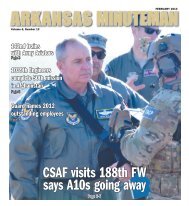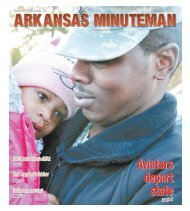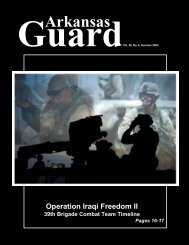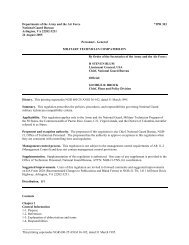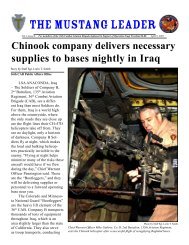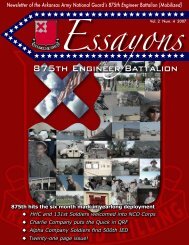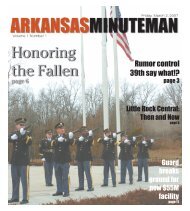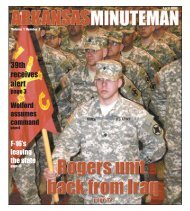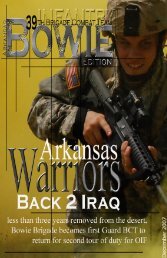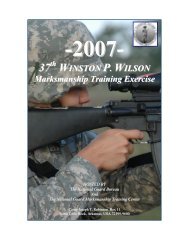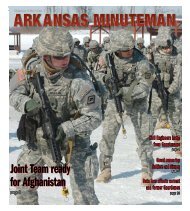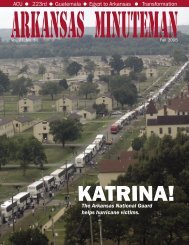Fighting New Battles - Arkansas National Guard
Fighting New Battles - Arkansas National Guard
Fighting New Battles - Arkansas National Guard
Create successful ePaper yourself
Turn your PDF publications into a flip-book with our unique Google optimized e-Paper software.
The <strong>Arkansas</strong> Minutemanto ancient times, and there is clear documentation in historicalmedical literature pointing to a Civil War disorder known as “DaCosta’s Syndrome.” A large amount of research covers PTSD inWorld War II and Holocaust survivors.Careful research and documentation of PTSD began inearnest after the Vietnam War. PTSD has subsequently beenobserved in all veteran populations including the Korean conflictand the Persian Gulf War.But PTSD is not only a problem for veterans. According tothe NCPTSD, it occurs in men and women, adults and children,Western and non-Western cultural groups, and all socioeconomicstrata. A 1995 study of American civilians estimated that thelifetime prevalence of PTSD was 5% in men and 10% in women.What are the symptoms of PTSD?Basically, PTSD is a set of reactions that can be normal immediatelyfollowing a traumatic event, but when these reactionscontinue long after combat or a traumatic event it can becomeserious. PTSD varies widely in how severe it can be, from mildand short lasting to severe and chronic, causing problems in gettingalong with family and friends, functioning on the job or atschool, or adjusting to the transition back to civilian life. Thereare three primary types of reactions or “symptoms:”• Re-Experiencing — Continuing to think about combat orfeeling as if still in combat. PTSD sufferers often have nightmaresabout events they have witnessed or actual combat situations.Sometimes they feel as though they are actually back inthe war zone. Some veterans report that some sights, sounds orsmells act as triggers for upsetting images of the war zone thatflash into their minds, making it difficult to think or concentrate.• Avoidance and numbing of emotion — Not wanting todiscuss the traumatic event, feeling detached from others orfeeling shut down emotionally. Individuals with combat stressreactions or PTSD often go to great lengths to prevent memoriesor discussions about their past experiences. They may withdrawemotionally or physically from family and friends. They mayeven become angry when asked to talk about their feelings orbehavior. Alcohol, drugs or prescription medications are sometimesused to help them avoid thinking or feeling.• Arousal — Having a hard time relaxing or feeling “onguard,” feeling jumpy, unable to sleep, unable to concentrate,excessive concerns about security, or getting angry easily. PTSDsufferers often have excessive concerns about their safety or thesafety of a loved one. They are jumpy or easily startled. Theymay find themselves closely examining people or places for signsof danger or attack. This “keyed up” feeling can also make itSee ‘PTSD’ on page 32Summer Fall 20052006 Page 31



